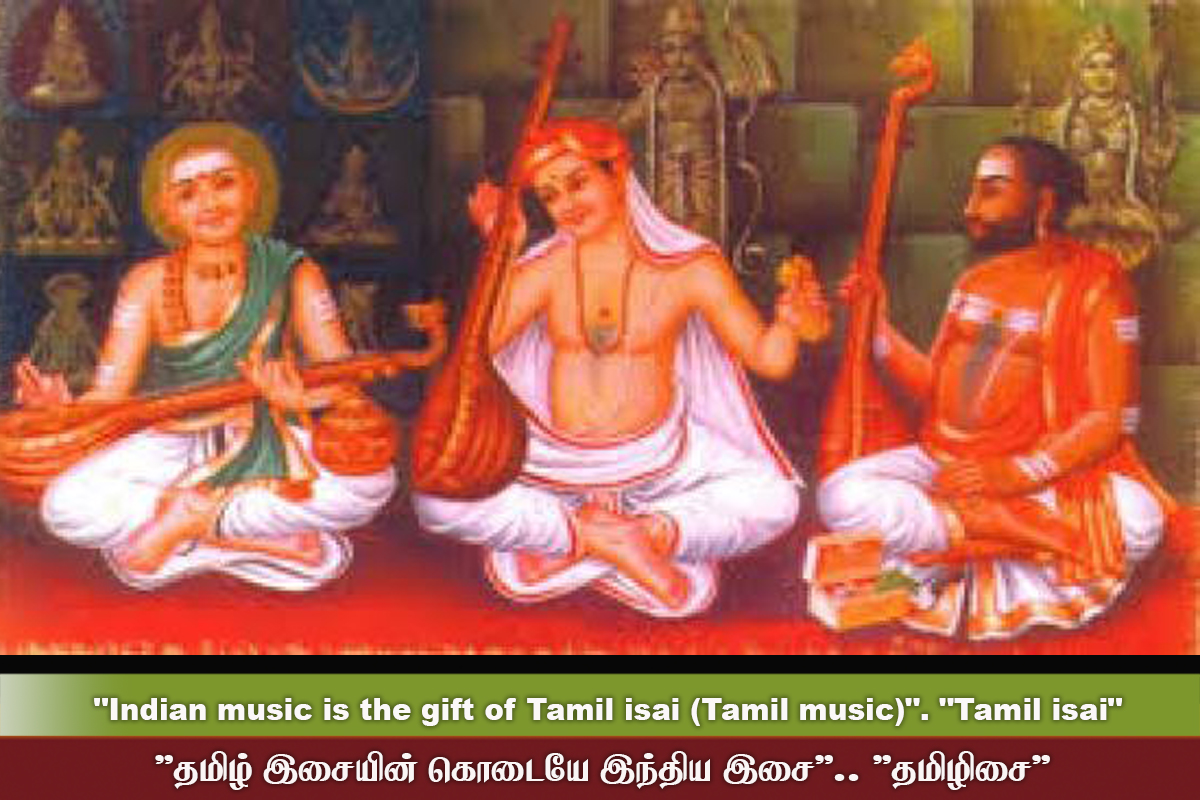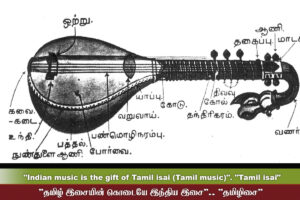

“Indian music is the gift of Tamil isai (Tamil music)”. “Tamil isai”

“Indian music is the gift of Tamil isai (Tamil music)”. “Tamil isai”
“Indian music is the gift of Tamil isai (Tamil music)”. “Tamil isai” is the musical method of Tamils that flourished in Tamil land. A collection of such poems composed in Tamil for playing music is called “Isai Tamil”. In the latter part of the 20th century, the glory of Tamil music was realized through the research of Tamil music by Abraham Pandithar, Vibulanandhar, etc., and it emerged as a movement. In 1942, the Tamilisai movement emerged due to the efforts of Annamalai Arasar, R.K.Shanmugam etc., A Tamil Music College was founded at Annamalai University and a Tamil Music Society was formed in Chennai. Prior to this, due to the anti-Hindi agitation, Periyar and Anna supported Tamil isai.
“No other race has developed music like the Tamils have; No other race has lost their music the way Tamils have” Arignar Anna mentioned that and stood in support of the effort to restore the ancient Tamil music. Sangam literatures are the testimony that Tamil isai was in its glorious phase during the Sangam period. When Tamil kings ruled, they nurtured Tamil isai. During the Pallava rule that followed the Kalabhras, northern languages gained a higher status. Northern language literary and grammatical works were composed in Tamil.
Towards the end of the Sangam Maruviya period (300-600 CE), Bhakti literature emerged and brought about a renaissance in Tamil isai. Although the northern language and Puranic impositions took place through devotional literature, Devaram, Thiruvasakam etc. were composed in musical form. From ninth century CE to the thirteenth century CE, Tamil isai flourished under the rule of the later Pandyas and later Cholas. After this period, in the Muhammadan, Nayak and Maratha rule, Tamil isai lost its glory and was renamed as Carnatic music in the 15th century. Although we are proud of Tamil isai, it is a bitter truth that ancient Tamil books on Tamil isai have not yet been discovered.
Although there are hints about the existence of Tamil isai, not even one palm leaf script has been found. Silappadhigaaram is the only Tamil classic which upholds ancient Tamil music. Later on, panns (பண்) and alagus (அலகு) mentioned in Silapadhigaaram have been named as ragas and thalas respectively in northern language and with the addition of lord Shiva’s story into it, a fabricated argument put forth that Carnatic music is the beginning of music. Shyama Shastri, Thyagarajar and Muthuswamy Dheekshidhar who lived in and around Thanjavur and Madurai in the 17th and 18th century were all Brahmins. They have not composed any Tamil hymns. They have not even sung a song in Tamil music. Everything is Carnatic music (Shastriya sangeetham).
 They composed Telugu hymns and sung in Telugu. Aryan’s drama (Arya koothu) is taking place every year in Thiruvaiyaru, singing about their “divine music” which has nothing to do with Tamil or Tamil isai. The North Indian historians who present them as musical triad, do not show even a single hint about Arunachala Kavirayar, Muthu Thandavar, Marimutha Pillai the Tamil isai triad who lived before them and who pioneered Tamil music. Tamil music trio, Tamil music triad, Primordial trinity, as they are called Wrote lyrics in Tamil, Sung in Tamil, And developed Tamil music, They are the greatest musical legends. Tamil music with such a long tradition is the basis of Indian music and Carnatic music.
They composed Telugu hymns and sung in Telugu. Aryan’s drama (Arya koothu) is taking place every year in Thiruvaiyaru, singing about their “divine music” which has nothing to do with Tamil or Tamil isai. The North Indian historians who present them as musical triad, do not show even a single hint about Arunachala Kavirayar, Muthu Thandavar, Marimutha Pillai the Tamil isai triad who lived before them and who pioneered Tamil music. Tamil music trio, Tamil music triad, Primordial trinity, as they are called Wrote lyrics in Tamil, Sung in Tamil, And developed Tamil music, They are the greatest musical legends. Tamil music with such a long tradition is the basis of Indian music and Carnatic music.
The musical form “Uruppadi (உருப்படி)” which is a Tamil musical song played by the Tamil isai trio with Pann (பண்) and Alagu (அலகு), became “Keerthanai” comprised of ragam and talaam. The elements of the “Uruppadi (உருப்படி)” “eduppu (எடுப்பு), thoduppu (தொடுப்பு), mudippu (முடிப்பு)” have been rendered as “pallavi, anupallavi, saranam” till now. This is the place Tamil has got in the history of Indian music. Everything was present and is present in Tamil. But the contemporary Aryan says in arrogance that Indian music is “Shastriya sangeetham”. It is strange and painful that there are Tamils who agree on that.
-Dr. Siva Ilango, Puducherry.